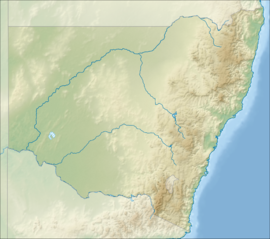Protected area in New South Wales, Australia
| Yuraygir National Park New South Wales | |
|---|---|
| IUCN category II (national park) | |
 Minnie Water Lake Minnie Water Lake | |
 | |
| Coordinates | 29°54′19″S 153°13′37″E / 29.90528°S 153.22694°E / -29.90528; 153.22694 |
| Established | 1980 |
| Area | 313.71 km (121.1 sq mi) |
| Managing authorities | New South Wales National Parks and Wildlife Service |
| See also | Protected areas of New South Wales |
Yuraygir is a national park in New South Wales, Australia, located 482 km (300 mi) northeast of Sydney. It was created in 1980, a result of the merger and enlargement of two national parks, Angourie and Red Rock National Parks, both of which had been established in 1975. At the time of its establishment in 1980, the park was fragmented, and parcels of land were bought over the following two decades to unite segments into a more contiguous protected area. Sometimes these acquisitions required protracted negotiations (and legal disputes) with land owners.
Etymology
The name is a phonetic translation of the local indigenous tribe who had lived in the area, and had formerly been transcribed variously as Jeigir, Jiegera, Jungai, Yagir, Yegera, Yegir, Yiegera or Youngai.
Description
Covering 65 km (40 mi) of coastline, it is the largest coastal park in New South Wales. The Yuraygir coastal walk traverses the coastline, and takes four days to complete. There are 48 beaches, including the highly regarded 800-metre (2,600 ft)-long Shelley Beach.
Thirty species of mammal have been recorded within the park, including the threatened rufous bettong (Aepyprymnus rufescens), tiger quoll (Dasyurus maculatus), brush-tailed phascogale (Phascogale tapoatafa) and squirrel glider (Petaurus norfolcensis). Swamps and wet heath are habitat for the threatened eastern ground parrot (Pezoporus wallicus) and eastern grass owl (Tyto longimembris).
Pests include feral pigs, cats, dogs and horses, and foxes, while problem weeds include groundsel bush (Baccharis halimifolia), bitou bush (Chrysanthemoides monilifera subsp. rotunda), lantana (Lantana camara) and slash pine (Pinus elliottii).
See also
References
- ^ Kijas, Johanna (November 2007). "Yuraygir National Park Contextual History" (PDF). Environment NSW. Sydney, New South Wales: Department of Environment and Climate Change. Archived (PDF) from the original on 27 July 2008. Retrieved 3 February 2015.
- "Yuraygir coastal walk". National Parks NSW. NSWNPWS. 29 January 2015. Retrieved 3 February 2015.
- Stone, Derrick (2012). Walks, Tracks and Trails of New South Wales. Csiro Publishing. p. 13. ISBN 9780643106901.
- Andrew D. Short, Brad Farmer (2012). 101 Best Australian Beaches. NewSouth. p. 176. ISBN 9781742245997.
- "Yuraygir National Park: Native animals". Environment NSW. Department of Environment and Climate Change. 29 January 2015. Retrieved 3 February 2015.
- "Yuraygir National Park: Pests and Weeds". Environment NSW. Department of Environment and Climate Change. 29 January 2015. Retrieved 3 February 2015.